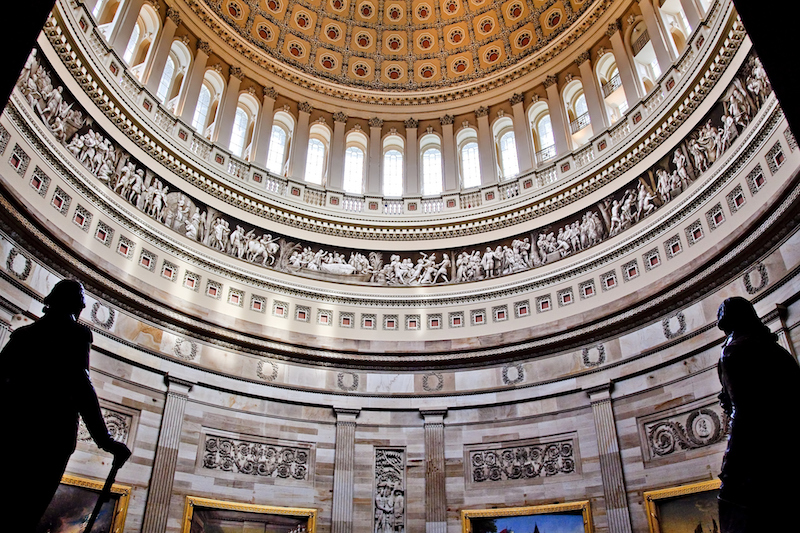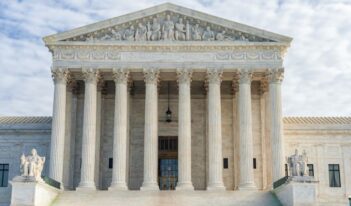
Does Congress delegate its authority to gain credibility with the public?
Do you trust Congress to make laws with your best interests at heart? If your answer is no, you are not alone: In late 2017, only about 35 percent of Americans trusted Congress, compared to 45 percent for the executive branch and 68 percent for the judiciary.
As the legislative branch, Congress’s primary task is lawmaking. But given the public’s greater trust in the executive branch, Americans may prefer administrative agencies—regulatory bodies within the more-trusted executive branch—to handle that job. Congress can, and often does, delegate its lawmaking power to agencies.
Jed Stiglitz, a professor at Cornell Law School, argues in a recent paper that legislators’ inability to engender trust in their constituents can explain congressional delegation of lawmaking power to agencies.
Stiglitz acknowledges the typical rationale for Congress to empower agencies, such as the U.S. Food and Drug Administration or U.S. Environmental Protection Agency, to enact regulations. The public values agencies because they have what legislatures lack—the technical expertise to make policy in areas otherwise inaccessible to a general legislative body.
As typically explained by legal scholars, Congress delegates lawmaking power to agencies because agencies are staffed with specialists that can devote their time to complex issues, such as the optimal dosage of a new drug or the safest level of ozone in the air, which may be beyond the capacity of a body like Congress.
But if expertise were the sole reason to delegate authority to an agency, Stiglitz asks, then why has Congress not simply expanded its own capacity for expertise? For example, Congress could appropriate money to a congressional office devoted to pharmaceutical regulation that could then advise Congress on appropriate legislation.
Stiglitz suggests that Congress delegates to agencies not because it lacks the ability to make informed decisions, but because it lacks the public’s trust.
Stiglitz highlights the limited ability for voters to understand how complex policies may affect their lives. For example, although many voters may be familiar with a bank, few understand the hundreds of rulemaking requirements within the Dodd-Frank Wall Street Reform and Consumer Protection Act.
And even if voters understood every complex issue, Stiglitz argues that they lack the information necessary to judge if their elected representative is making decisions in their best interests. For instance, members of Congress do not need to show that legislation benefits the public more than a single special interest group.
This is particularly important where the public may distrust a legislator’s impartiality in regulating wealthy industries that make major political contributions, such as the financial services or pharmaceutical industries. If voters doubt their legislator’s fidelity and legislation’s fairness, they may vote their member of Congress out of office.
Legislators, therefore, have an interest in ensuring another body regulates these well-resourced industries with complex, inaccessible issues.
Stiglitz proposes that administrative agencies are ideal for this task because—unlike Congress—procedural constraints enforce agency transparency, fairness, and accountability.
Agencies must navigate procedural formalities that encourage transparency. For example, agencies must publish comments from the public, justify rules with benefit-cost analysis, and often disclose relevant conversations with the industries they regulate.
Stiglitz also argues that these formalities make agencies more trusted to reach a fair outcome, because it would be difficult to hide favoritism for one special interest group at the expense of the public when an agency must publish an objective cost-benefit analysis and disclose its communications with the regulated industry.
Finally, although an agency head is not accountable to voters, Stiglitz contends that agency actions are more accountable to judicial review than those of Congress. Because agencies are subordinate to the President within the executive branch, and not coequal with Congress and the U.S. Supreme Court, courts scrutinize agencies more readily than Congress. Stiglitz contends that increased scrutiny from the judiciary—the most trusted branch of U.S. government according to a recent Gallup poll—accounts for greater public trust in agency actions.
It is ironic, Stiglitz acknowledges, that administrative agencies are more trustworthy than Congress precisely because they face such institutional distrust. But just as constraints upon agencies grant them trust, Stiglitz proposes that erosions in administrative law or agency constraints can diminish public trust. For example, political polarization of the Supreme Court can breed distrust because the public may perceive that judicial checks on agencies rest on political ideology rather than on legal rationale.
For those who distrust agencies and look to reform them, Stiglitz cautions against changes that aim to make agencies more accountable to the democratic process, as this will only make them more similar to Congress. For instance, Stiglitz argues that strengthening the non-delegation doctrine, which limits the scope of legislative power Congress can grant to agencies, would be a misplaced effort, as agency lawmaking can benefit the public more than legislative lawmaking in many situations.
Stiglitz instead urges reforms that enhance the existing traits that have given agencies a trust advantage over Congress: transparency, fairness, and judicial accountability. Reforms could pursue transparency through more formal procedural requirements, such as requiring the publication of all agency actions in the Federal Register. Or courts could require agencies to follow stricter deliberation requirements, promoting increased public participation in the rulemaking process.
Stiglitz encourages additional procedural formality in agency lawmaking because such constraints pushed Congress to delegate in the first place.
Stiglitz’s article appeared in the University of Pennsylvania Law Review.



